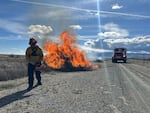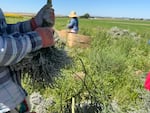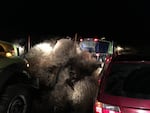
Tumbleweeds are torched at the Hanford cleanup site in southeast Washington in the early part of this year.
Courtesy of U.S. Department of Energy
Fire Chief Nickolus Thomas’ specially-trained firefighters at the Hanford site in southeast Washington burned 30,000 cubic feet of tumbleweeds in just one spot earlier this year. Out here, he says a massive pile of weeds is called a “jackpot.”
“Doesn’t sound like a lot, but when you talk about a tumbleweed pile that’s a mile long and 6 feet high – that’s a lot of tumbleweeds that have piled up and collected over the past couple of years,” Thomas said.

Western tumbleweeds are not a fan of Hanford Fire Chief Nickolus Thomas. He has three full-time firefighters working half the year to eradicate them along roadways and sensitive areas at the Hanford site.
Anna King / NWPB
But in other parts of the country, people are paying to have tumbleweeds shipped to their doorstep — thanks to home decor company Bloomist.
A dry pile of the weeds can burn 6 to 10 feet tall. And burning tumbleweeds at the Hanford nuclear cleanup site — with sensitive areas like near world-renowned laboratories that look for black holes in space — takes a lot of paperwork:
“The piles have to be surveyed to make sure they don’t have any radiation or any type of contamination,” Thomas said. We have to make sure we’re not in any cultural sensitive zone as well for the Native Americans. And then also, any specialized owl or burrowing squirrel or anything else that hangs around the Hanford site.”
These tumbleweeds are also called the Russian thistle. It likely made its way to the West in a bad load of flaxseed in the late 1800s.
Modern weeds
On the Bloomist website, tumbleweeds are featured in large bowls and on rustic wooden tables, all with stark modern photography. Bloomist is a popular decor website that claims to “Make Nature Home.” A large one will set you back $88, plus shipping. That’s causing some chuckles in Northwest shrub-steppe country. In the Mid-Columbia, the weed grows quickly in the margins of irrigation pivots or the edges of roads.
Diann Lovejoy, of Eltopia, has teams of women deftly cutting and bundling flowers out in the fields of her farm.
Lovejoy sells her flowers to brokers — like Bloomist. She almost wasn’t surprised that the decor site is selling large Russian thistles, or tumbleweeds too.
“People who buy tumbleweeds, I wonder, if they’re are very aware of how invasive Russian thistle is,” Lovejoy said.

At Lovejoy Farms, women work to bundle flowers in the fields for home decor brokers and sellers, like Bloomist.
Anna King / NWPB
The problem with weeds
Rui Liu is with Washington State University, and is based in Prosser. She has studied weeds for 15 years.
“Once it establishes it’s just hard to get rid of,” Liu said. “And you can use, like mowing and take them out before they are too big, but once they are established and the plant matures it can take a lot of resources to totally control this species.”
Anne Schuster, an education specialist for the Washington State Noxious Weed Control Board, said tumbleweeds have become so widespread in Washington and parts of the West that many states, like Washington, don’t even try to control this type of weed now. But she was incredulous that someone would box up the weeds laden with small seeds and send them around the country.
“They are still invasive and cause nuisance to farmers, ranchers, orchard growers and fruit growers,” Schuster said. “A lot of these professions are struggling with weed control already, and it would be a shame to add to their work.”
Schuster said it’s not that surprising that websites are selling tumbleweeds, just disappointing.
“A lot of people sell seeds and plants that are invasive,” she said. “A lot of not native plants don’t cause problems, but the ones that do, really do — and tumbleweeds are one of them.”
‘Weeds are worth it
Bloomist says the weeds have been popular since their shop went live. The tumbleweeds come from a farm in Utah, says Michael Zung, the company’s CEO. And they are sculptural, he says.
“If you actually Google ‘dried tumbleweed’ we come up number one,” Zung said. “And we work with a farmer in Utah that delivers these for us.”
Zung said criticism of the tumbleweed shipments has come up before, but he said the ‘weeds are worth it.
“In the Northeast, we don’t have them,” he said. “So a lot of people like them in their homes for certain decor items. And they are large, so cleaning something like that up, we don’t just pick any of them in the ditch. It takes labor to go get them. They’re prickly, so you have to wear gloves.”

Cars were buried in tumbleweeds along Highway 240 near Richland in 2020 during an event known as “Tumblegeddon.”
Washington State Department of Transportation
‘Tumblegeddon’
But tumbleweeds are more than a small nuisance in the West.
Back on Jan. 1, 2020, on the Hanford site, cars with people in them were buried in tumbleweeds by strong winds. Nine million cubic yards of tumbleweeds blocked a highway near Richland.
“The big question was where do we put this?” said Summer Derrey, with the Washington State Department of Transportation in an email. “Our maintenance crews worked alongside members of the Yakama Nation Cultural Resources Center as we burned all this debris ensuring that no artifacts or cultural resources were disturbed.”
The tumble mess was captured on video and was coined “Tumblegeddon.”
Tumbleweeds are the star of old Western songs — like the one by The Sons of the Pioneers. But now, tumbleweeds are newly expanding their range past the West, with the help of the web — plus postage.
NWPB reporter Rachel Sun contributed to this report.